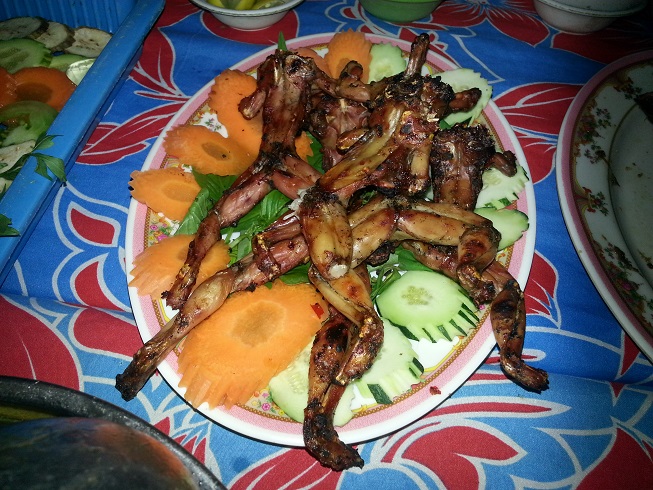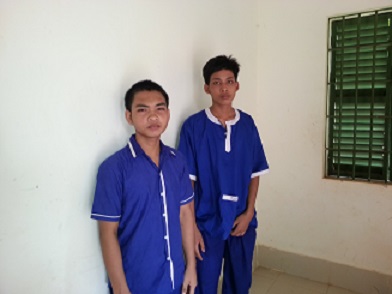Kampong Thom Province
Our bus arrived in Kampong Thom early in the afternoon of June 9. That evening, the IBJ lawyer in Kampong Thom, Mr. Nou Chandeth, invited the four of us out for dinner. We sat in an open air restaurant and ate a variety of dishes, including fried frog and boiled eel; shockingly enough, it was the first time I had eaten either one. Both tasted fine, but my mind and eyes proved more persuasive than my tongue and I did not dare to ask for seconds, especially because the meat was served in the same form as the living creature it had once been.

Back in our guesthouse, I had to readjust to the six-dollar-per-night conditions after having spent the three previous days on the company retreat in Siem Reap at the three-star Ree Hotel. Five chirping lizards, scurrying up and down the walls and ceiling, did their best to sing me to sleep. At least they eat the mosquitos.
The next morning, after breakfast, we interviewed the judge who serves as court president. Jocular, short, and stocky, with a shock of black hair combed across his broad forehead, he oversees the other court officials and ensures that they follow the correct procedures. For almost an hour, we asked him the usual monitoring and evaluation questions to guage how the IBJ lawyer there is getting along with court officials. He said that the relationship between IBJ and the court is strong and all the judges refer felony and juvenile cases to Mr. Nou. He made a point to mention Mr. Nou's heavy caseload, however: ten to fifteen trials per month. He suggested that IBJ send another lawyer to assist in Kampong Thom. We wrote down his suggestion, but we knew that the already-tight budget would not permit IBJ to hire another lawyer.
Next, we met the chief of police. Older and sterner than the judge, his thin, but still powerful build gave an aura of strength and authority as he peered at us from behind his thick, wooden desk. He said that the police have a good relationship with IBJ, thanks to Mr. Nou's efforts to socialize with the officers; but, he stubbornly refuses to inform Mr. Nou directly when his officers arrest an indigent person. Instead, he transfers the cases to the prosecutor and leaves the decision in the latter's hands to contact IBJ when an accused person requires free representation. Hopefully, over time Mr. Nou will develop a closer relationship with the chief and persuade him, at least, to give the IBJ staff a heads-up whenever their services might be necessary. Such a minor concession would go a long way toward solving the problem of late referrals and the consequent trial postponements that extend an accused person's stay in pre-trial detention.
In the afternoon, I visited a prison for the first time to interview two young IBJ clients who were recently convicted, but, thanks to Mr. Nou, received much lesser sentences than they might have otherwise. The prison was far less secure than I had imagined. From the front gate, I could see guards in the central courtyard, slouched casually around a wooden table, drinking beer and smoking cigarettes under the shade of a patchy, cloth canopy. The entrance gate was even left open and a few prisoners, marked by their blue jump suits, walked in and out freely, carrying rakes, hoes, and other tools that could easily have been used as weapons. Apparently these men and women had been given permission to break the monotony of prison life by working in the surrounding gardens.
The severe expression on the face of the prison chief starkly constrasted with the relaxed prison atmosphere. During our conversation with him, it seemed to take all his effort to crack even a thin smile whenever he felt obliged to do so out of courtesy. After checking our credentials, he led us into the inner courtyard where my eyes were drawn first to a large group, the majority of the roughly 350 prisoners in Kampong Thom, squatting idly behind the wire partition fences. They were not fortunate enough to have been assigned a chore. IBJ's monitoring and evaluation officer, who served as my translator for the afternoon, Sam, and I sat in a small, ten-by-ten-foot shack designated as the interview and meeting room. Soon afterwards sixteen-year-old Paeakdey and seventeen-year-old Som joined us. Paeakdey has just begun serving a seven-month sentence for aggravated violence and Som, likewise, has just begun his eight-month sentence for theft.

For the past few years, after his parents could no longer afford to provide for him, Paeakdey lived with his grandfather. At first, he felt comfortable and loved there, but trouble began when his seventy-year-old grandfather remarried a woman forty-three years his junior. The woman did not cause the difficulties, rather the instigator was her twenty-three-year-old brother, Veasna, who did not get along with Paeakdey from the first. Veasna taunted Paeakdey constantly, most often by accusing the boy of stealing fruit from his tree. Like mercilessly poking at a small sore, Veasna’s innocuous but constant bullying over the course of many months became insufferable for Paeakdey. One evening, Veasna came to the grandfather’s home and, more vociferously than usual, hurled the same old accusation. Paeakdey broke down and threw a punch, but the twenty-four-year-old was too strong for the sixteen-year-old. When Paeakdey believed that Veasna might seriously injure him, like a cornered animal lunging forward with all its strength and nothing to lose, he grabbed a thick stick from the ground and viciously swung it into the older man’s head.Veasna’s wound required three stitches and Paeakdey was arrested on the scene.
The police held him in the district post for one day, then another day in the provincial police post, before finally taking him to the court to see the prosecutor and investigating judge. The two of them interrogated Paeakdey for over an hour. When he confessed, they sent him to provisional, pre-trial detention in Kampong Thom prison. After he had been detained there for three months, his parents called Mr. Nou and he agreed to take on the case.
Paeakdey’s father recently passed away, but his mother is back in his life now. She blames his grandfather for inviting trouble into the house and not protecting his grandson. She can only afford to travel the sixty kilometers to visit him once every two months, but Mr. Nou visited him twice before his trial. Paeakdey stood charged of aggravated violence with a weapon under Article 217 of the Criminal Code, a crime noted for its vagueness in the preface to the English translation of the Code. At the trial, on May 21, 2013, Mr. Nou argued for a sentence reduction from the maximum five years because Paeakdey had confessed voluntarily, was very poor, and the civil plaintiff had dropped his case. (Although, according to Paeakdey, his “great-uncle,” the civil plaintiff, is trying to extort $3,000 from the family outside of court). The presiding judge questioned Paeakdey for half an hour before handing down a two-year sentence with seventeen months suspended in exchange for a fine of two million riel ($500). The fine will not be easy to pay, but Paeakdey’s mother will manage to collect it somehow in order to bring her young son home.
Som, the youngest of five children, dropped out of school in the third grade and has been farming for his family ever since. One night in November, 2012, he saw an unguarded motorbike in an isolated area across the street from his older brother’s house. He could not resist the temptation to take the bike and resell it for what he thought would be easy money. He had never stolen a bike before, but he knew how to jumpstart one without a key from years of working with old, rickety motorbikes on the farm. After successfully starting the engine, he rode the bike to a nearby village, parked it and went into a dance club. When a policeman passed and saw that this motorbike had been started without a key, he walked into the club, found Som, and arrested him. Som was taken first to the district police station. The police conducted the interrogation by the book and he confessed after just thirty minutes. Afterwards, the police transported him to Kampong Thom prison where he would remain in pre-trial detention for six months.
Because Som’s family knew about IBJ, they called the hotline as soon as they heard he had been detained. Unfortunately, that was all they could do for him because they live very far from the prison and cannot afford to visit from their home in Kampong Chhnang province. Som was frightened and, ironically, lonely in a room crammed with sixty people. On May 10, 2013, Mr. Nou argued Som’s case before the judge, emphasizing his poverty and lack of education. The judge sentenced Som to eight months instead of the maximum three years. Som is determined never to steal again. He does not know what came over him that night, but he is happy that he will have the chance to make up for his crime and return to his normal life sooner rather than later.
Under Article 160 of the Cambodian Criminal Code, any person over the age of fourteen may receive a jail sentence, with qualifications. (For minors over the age of fourteen, “the maximum sentence of imprisonment incurred shall be reduced by half; if life then reduced to twenty years; and minimum and maximum fines shall be reduced by half.”) Juvenile and adult offenders are separated in Kampong Thom prison, as is required by the criminal code, but this is not the case in all Cambodian prisons. Mr. Nou pays special attention to juvenile clients and makes sure to visit them at least twice before their trials. During the visits he does more than simply rehearse their defenses, he also listens to them and counsels them. When he is in their villages, investigating cases, or following up on clients who have been released, he sees the poor conditions in which most of his young clients live and this motivates him to fight especially hard for them. He prepares defenses for guilty clients, like these two boys, as dedicatedly as he does for his innocent clients because he believes that, in the long run, only by giving his all for every client, not simply the most sympathetic, will he encourage all Cambodians to be more jealous and assertive of their rights.